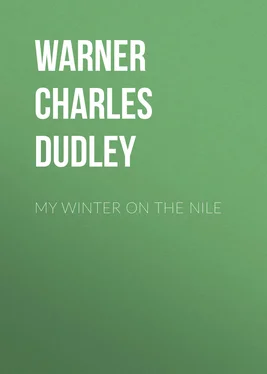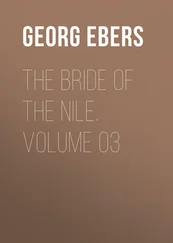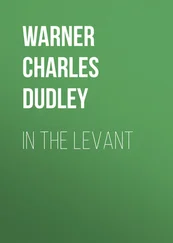Charles Warner - My Winter on the Nile
Здесь есть возможность читать онлайн «Charles Warner - My Winter on the Nile» — ознакомительный отрывок электронной книги совершенно бесплатно, а после прочтения отрывка купить полную версию. В некоторых случаях можно слушать аудио, скачать через торрент в формате fb2 и присутствует краткое содержание. Жанр: Путешествия и география, История, foreign_edu, foreign_antique, foreign_prose, на английском языке. Описание произведения, (предисловие) а так же отзывы посетителей доступны на портале библиотеки ЛибКат.
- Название:My Winter on the Nile
- Автор:
- Жанр:
- Год:неизвестен
- ISBN:нет данных
- Рейтинг книги:5 / 5. Голосов: 1
-
Избранное:Добавить в избранное
- Отзывы:
-
Ваша оценка:
- 100
- 1
- 2
- 3
- 4
- 5
My Winter on the Nile: краткое содержание, описание и аннотация
Предлагаем к чтению аннотацию, описание, краткое содержание или предисловие (зависит от того, что написал сам автор книги «My Winter on the Nile»). Если вы не нашли необходимую информацию о книге — напишите в комментариях, мы постараемся отыскать её.
My Winter on the Nile — читать онлайн ознакомительный отрывок
Ниже представлен текст книги, разбитый по страницам. Система сохранения места последней прочитанной страницы, позволяет с удобством читать онлайн бесплатно книгу «My Winter on the Nile», без необходимости каждый раз заново искать на чём Вы остановились. Поставьте закладку, и сможете в любой момент перейти на страницу, на которой закончили чтение.
Интервал:
Закладка:
We pass the cemetery, for the Pillar is on a little hillock overlooking it. Nothing can be drearier than this burying-ground—unless it may be some other Moslem cemetery. It is an uneven plain of sand, without a spear of grass or a green thing. It is covered thickly with ugly stucco, oven-like tombs, the whole inconceivably shabby and dust covered; the tombs of the men have head-stones to distinguish them from the women. Yet, shabby as all the details of this crumbling cheap place of sepulture are, nothing could be gayer or more festive than the scene before us. Although the women are in the majority, there are enough men and children present, in colored turbans, fezes, and gowns, and shawls of Persian dye, to transform the graveyard into the semblance of a parterre of flowers. About hundreds of the tombs are seated in a circle groups of women, with their food before them, and the flowers laid upon the tomb, wailing and howling in the very excess of dry-eyed grief. Here and there a group has employed a “welee” or holy man, or a boy, to read the Koran for it—and these Koran-readers turn an honest para by their vocation. The women spend nearly the entire day in this sympathetic visit to their departed friends—it is a custom as old as history, and the Egyptians used to build their tombs with a visiting ante-chamber for the accommodation of the living. I should think that the knowledge that such a group of women were to eat their luncheon, wailing and roosting about one’s tomb every week, would add a new terror to death.
The Pillar, which was no doubt erected by Diocletian to his own honor, after the modest fashion of Romans as well as Egyptians, is in its present surroundings not an object of enthusiasm, though it is almost a hundred feet high, and the monolith shaft was, before age affected it, a fine piece of polished Syenite. It was no doubt a few thousand years older than Diocletian, and a remnant of that oldest civilization; the base and capital he gave it are not worthy of it. Its principal use now is as a surface for the paint-brushes and chisels of distinguished travelers, who have covered it with their precious names. I cannot sufficiently admire the naïveté and self-depreciation of those travelers who paint and cut their names on such monuments, knowing as they must that the first sensible person who reads the same will say, “This is an ass.”
We drive, still outside the walls, towards the Mahmoodéeh canal, passing amid mounds of rubbish, and getting a view of the desert-like country beyond. And now heaves in sight the unchanged quintessence of Orientalism—there is our first camel, a camel in use, in his native setting and not in a menagerie. There is a line of them, loaded with building-stones, wearily shambling along. The long bended neck apes humility, but the supercilious nose in the air expresses perfect contempt for all modern life. The contrast of this haughty “stuck-up-ativeness” (it is necessary to coin this word to express the camel’s ancient conceit) with the royal ugliness of the brute, is both awe-inspiring and amusing. No human royal family dare be uglier than the camel. He is a mass of bones, faded tufts, humps, lumps, splay-joints and callosities. His tail is a ridiculous wisp, and a failure as an ornament or a fly-brush. His feet are simply big sponges. For skin covering he has patches of old buffalo robes, faded and with the hair worn off. His voice is more disagreeable than his appearance. With a reputation for patience, he is snappish and vindictive. His endurance is over-rated—that is to say he dies like a sheep on an expedition of any length, if he is not well fed. His gait moves every muscle like an ague. And yet this ungainly creature carries his head in the air, and regards the world out of his great brown eyes with disdain. The Sphinx is not more placid. He reminds me, I don’t know why, of a pyramid. He has a resemblance to a palm-tree. It is impossible to make an Egyptian picture without him. What a Hapsburg lip he has! Ancient, royal? The very poise of his head says plainly, “I have come out of the dim past, before history was; the deluge did not touch me; I saw Menes come and go; I helped Shoofoo build the great pyramid; I knew Egypt when it hadn’t an obelisk nor a temple; I watched the slow building of the pyramid at Sakkara. Did I not transport the fathers of your race across the desert? There are three of us; the date-palm, the pyramid, and myself. Everything else is modern. Go to!”
Along the canal, where lie dahabeëhs that will by and by make their way up the Nile, are some handsome villas, palaces and gardens. This is the favorite drive and promenade. In the gardens, that are open to the public, we find a profusion of tropical trees and flowering shrubs; roses are decaying, but the blossoms of the yellow acacia scent the air; there are Egyptian lilies; the plant with crimson leaves, not native here, grows as high as the arbutilon tree; the red passion-flower is in bloom, and morning-glories cover with their running vine the tall and slender cypresses. The finest tree is the sycamore, with great gnarled trunk, and down-dropping branches. Its fruit, the sycamore fig, grows directly on the branch, without stem. It is an insipid fruit, sawdust-y, but the Arabs like it, and have a saying that he who eats one is sure to return to Egypt. After we had tried to eat one, we thought we should not care to return. The interior was filled with lively little flies; and a priest who was attending a school of boys taking a holiday in the grove, assured us that each fig had to be pierced when it was green, to let the flies out, in order to make it eatable. But the Egyptians eat them, flies and all.
The splendors of Alexandria must be sought in books. The traveler will see scarcely any remains of a magnificence which dazzled the world in the beginning of our era. He may like to see the mosque that marks the site of the church of St. Mark, and he may care to look into the Coptic convent whence the Venetians stole the body of the saint, about a thousand years ago. Of course we go to see that wonder of our childhood, Cleopatra’s Needles, as the granite obelisks are called that were brought from Alexandria and set up before a temple of Caesar in the time of Tiberius. Only one is standing, the other, mutilated, lies prone beneath the soil. The erect one stands near the shore and in the midst of hovels and incredible filth. The name of the earliest king it bears is that of Thothmes III., the great man of Egypt, whose era of conquest was about 1500 years before St. Mark came on his mission to Alexandria.
The city which has had as many vicissitudes as most cities, boasting under the Cæsars a population of half a million, that had decreased to 6,000 in 1800, and has now again grown to over two hundred thousand, seems to be at a waiting point; the merchants complain that the Suez Canal has killed its trade. Yet its preeminence for noise, dirt and shabbiness will hardly be disputed; and its bazaars and streets are much more interesting, perhaps because it is the meeting-place of all races, than travelers usually admit.
We had scarcely set foot in our hotel when we were saluted and waited for by dragomans of all sorts. They knocked at our doors, they waylaid us in the passages; whenever we emerged from our rooms half a dozen rose up, bowing low; it was like being a small king, with obsequious attendants waiting every motion. They presented their cards, they begged we would step aside privately for a moment and look at the bundle of recommendations they produced; they would not press themselves, but if we desired a dragoman for the Nile they were at our service. They were of all shades of color, except white, and of all degrees of oriental splendor in their costume. There were Egyptians, Nubians, Maltese, Greeks, Syrians. They speak well all the languages of the Levant and of Europe, except the one in which you attempt to converse with them. I never made the acquaintance of so many fine fellows in the same space of time. All of them had the strongest letters of commendation from travelers whom they had served, well-known men of letters and of affairs. Travelers give these endorsements as freely as they sign applications for government appointments at home.
Читать дальшеИнтервал:
Закладка:
Похожие книги на «My Winter on the Nile»
Представляем Вашему вниманию похожие книги на «My Winter on the Nile» списком для выбора. Мы отобрали схожую по названию и смыслу литературу в надежде предоставить читателям больше вариантов отыскать новые, интересные, ещё непрочитанные произведения.
Обсуждение, отзывы о книге «My Winter on the Nile» и просто собственные мнения читателей. Оставьте ваши комментарии, напишите, что Вы думаете о произведении, его смысле или главных героях. Укажите что конкретно понравилось, а что нет, и почему Вы так считаете.












